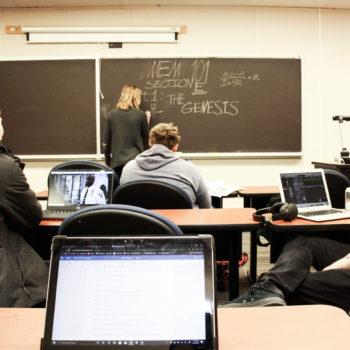 In a modern classroom setting, one may find two kinds of students: some who use their laptop to take notes and organize materials, and others who use traditional paper and pencil. Professors today are forced to adapt to this change, which causes a divide in expectations between themselves and their students.
In a modern classroom setting, one may find two kinds of students: some who use their laptop to take notes and organize materials, and others who use traditional paper and pencil. Professors today are forced to adapt to this change, which causes a divide in expectations between themselves and their students.
In class, students typically use their laptops to take notes, review material, or read their textbook. Almost all textbooks today come with an eBook companion, which students can buy instead of the physical textbook — sometimes at a lower cost. Liberal Arts major Connor Flynn says he feels that he has a right to use technology: “I paid for this class, you’re [the professor] already getting paid, why should you be telling me what I should be doing with my phone or with my technology?”
History Professor Paul Byrd allows technology, but says students should know what is appropriate and what isn’t: “There is a level of respect to show too, I get if you’re going to mess around on your phone for 10 seconds –– that’s fine, but if you’re doing it the whole time you’re sitting there, it’s a little excessive.”
Byrd shares his philosophy when it comes to technology in the classroom: “If I allow [technology] in class, then at least they’re looking at it above the table; [if it’s] under the table, I know they’re messing around.I know it’s going to happen either way, so I’ve just decided to embrace it instead to kind of adapt to them in some ways.”
While students may not feel distracted by technology in the classroom, they certainly can be at home. Chemistry major Evan Sadowsky says that depending on the day, he can spend two to five hours on his phone, and that it can affect his productivity. When studying at home, the temptation of checking your phone can be too alluring. Liberal Arts major Megan Conrad says she has found a way to combat this: “I have my phone set to not let me use apps at certain times so that I’m more productive, and I don’t waste a ton of time on my phone.” Conrad adds, “You waste so much time on your phone if you’re talking to friends or something, it just takes you away.”
Spanish Professor Stacy Amling agrees phones can be a distraction: “[For Spanish] I’ve done the research and had been looking at the cognitive load that is required for learning the language; you’re doing yourself a disservice if you’re not coming into class ready to pay attention and trying to learn as much as you can.”





Comments